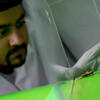Master of Science in Bioengineering
Earn a Master of Science in Bioengineering and pursue interdisciplinary research into specialized biomedical research areas. Develop the expertise that will advance your career, help you transition into the field or prepare you for doctoral study.
Bioengineering focuses on the application of advanced technology to solve complex biologic problems. Through this master’s program, you’ll gain the credentials to claim expert status in areas ranging from tissue engineering to biomechanics and bioelectronics.
The program can be pursued through a customized area of specialization. Interdisciplinary collaboration is encouraged with faculty in- and outside the College of Engineering. Students have worked with researchers in Temple’s Fox Chase Cancer Center, Katz School of Medicine, Kornberg School of Dentistry, and College of Science and Technology.
This flexible master’s program can be completed full or part time, and evening classes are available. The departmental community is small, offering you an intimate learning experience with easy access to faculty. Also, because the program was established in 2012, all its lab facilities are state-of-the-art, providing additional return on your investment in this highly affordable degree program.


